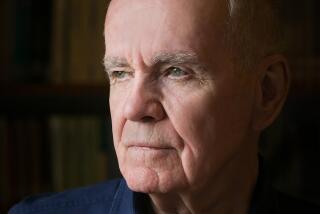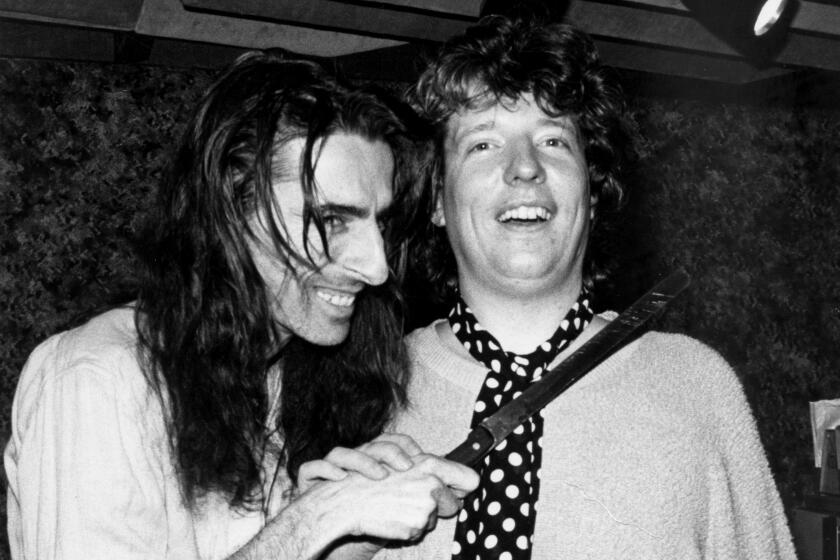Reynolds Price dies at 77; author and longtime Duke professor
- Share via
In 1984, when he was 51, novelist Reynolds Price learned that a pencil-shaped tumor, about 10 inches long and malignant, had invaded his spine. Several surgeries and dozens of radiation treatments followed, leaving him a paraplegic racked with pain and the uncertainty of his survival. His happy life of teaching Milton at Duke University and writing several hours a day was over, or so it seemed in his many dark moments.
Then, after a year of this agony, something miraculous happened: He knocked out a commissioned play in two months and finished the last two-thirds of his seventh novel, “Kate Vaiden,” which won the National Book Critics Circle Award as the best work of fiction in 1986. Poems, short stories, memoirs and more novels poured out of him faster than before, turning the last 25 years into the most productive of his distinguished writing life.
“Writing is a fearsome but grand vocation — potentially healing but likewise deadly,” he told the Paris Review some years ago. “I wouldn’t trade my life for the world.”
Hailed as “one of our major writers” by Eudora Welty, Price, 77, died of a heart attack Thursday in Durham, N.C., said a spokesman for Duke University, where he taught for 53 years.
Widely admired as an acute observer of family life in small Southern towns, he won the William Faulkner Award for his first novel, “A Long and Happy Life” (1962), which introduced the saga of the Mustian family. Over the next five decades he produced more than three dozen books of fiction, poetry and autobiography. Fourteen were novels, including the epics “The Surface of Earth” (1975) and “The Source of Light” (1981).
He said the hypnosis techniques he learned to manage his pain freed memories that led him to write memoirs: “Clear Pictures” (1989) focused on his childhood, “A Whole New Life” (1994) on his illness and recovery, and “Ardent Spirits” (2009) on his years as a graduate student at Oxford and the beginning of his academic career. In the latter he wrote for the first time about being a gay man — he preferred to be called “queer” — after decades of refusing to answer questions about his sexuality.
He hated being cast by critics as a Southern writer, a label he found degrading; he often noted with some sarcasm that “none of my characters are hillbillies.” His stories plumbed universal themes — love, death, alienation — in a prose style that English writer Stephen Spender described in a 1987 New York Times interview as “a kind of writing that is actually poetry.”
All of Price’s novels unfold on his native terrain, North Carolina, where he spent nearly his entire life. Remarking on the authenticity that stems from his intimate knowledge of the region, novelist Anne Tyler, a former student of Price, once said, “Any North Carolinian, reading one of his novels, must stop at least once per page to nod at the rightness of something a character says. It’s not just the tone that’s right; it’s the startling, almost incongruous eloquence....”
Although he often said he was not influenced by Faulkner, he did show Faulknerian virtuosity. The paragraph-long opening line of “A Long and Happy Life” begins, “Just with his body and from inside like a snake, leaning that black motorcycle side to side, cutting in and out of the slow line of cars to get there first, staring due-north through goggles towards Mount Moriah and switching coon tails in everybody’s face was Wesley Beavers, and laid against his back like sleep was Rosacoke Mustian who was maybe his girl....” Dorothy Parker, in a review for Esquire, wrote that it was a meticulously observed and lovely novel “with the firm brilliance of its writing to keep its loveliness from sticking to your fingers.”
The eldest of two children, Price was born Feb. 1, 1933, in Macon, N.C. His parents made up for their lack of money in the close bond they had with their firstborn son. He described his mother as a free spirit who loved to drive into the city, park the car and watch people go by, and credited her with the powers of observation that nourished his imagination.
His writing talent was encouraged by his high school English teacher, who pushed him to apply to Duke; he won a full scholarship and studied there under a legendary English professor, William Blackburn. He met Welty when she came to speak there. She was so impressed with a story of his that she forwarded it to her agent, Diarmuid Russell, who took on Price as a client.
After graduating from Duke in 1955, he studied at Oxford on a Rhodes scholarship. During his time there he met W.H. Auden and Spender, who published an early story featuring Rosacoke Mustian, the country girl Price would draw more fully in his first novel and two subsequent ones. Critics often praised the vibrancy of his female characters.
In 1958 he returned to North Carolina to teach at his alma mater. A demanding and beloved teacher, he was “a part of the soul of Duke,” President Richard H. Brodhead said in a statement last week.
Price is survived by a brother, Will, of Raleigh.
More to Read
Start your day right
Sign up for Essential California for the L.A. Times biggest news, features and recommendations in your inbox six days a week.
You may occasionally receive promotional content from the Los Angeles Times.







